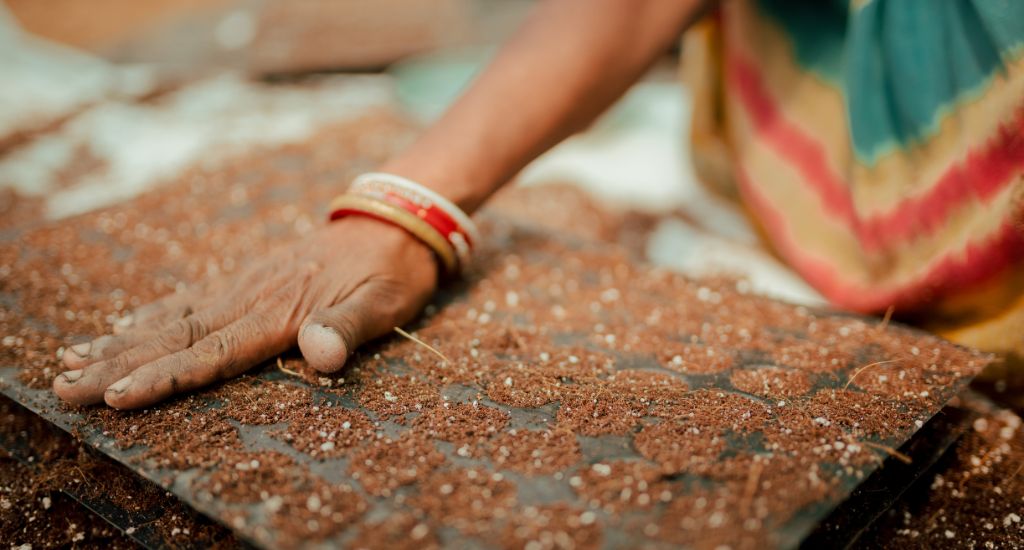
‘Soilless’ farming bears fruit for Odisha women farmers
Digital Green-supported initiatives in which saplings are grown in a mixture of composts and then planted in dry farmlands are getting growers better returns in Keonjhar district.

Digital Green-supported initiatives in which saplings are grown in a mixture of composts and then planted in dry farmlands are getting growers better returns in Keonjhar district.
Rashmita of Medinipur village in Odisha’s Keonjhar district watched helplessly when her husband had to migrate to Telangana to find work some five years ago.
The small patch of farmland that the couple owns could not be adequately cultivated in absence of proper irrigation, and Rashmita could barely do anything to stop her desperate husband from leaving.
The paddy that could be grown in the land was not enough for the family to sustain for the whole year and Rashmita’s helpless state continued. She and her two daughters barely survived with the meagre money that her husband managed to send every month.

Things, however, are beginning to look up now.
Since August 2022, Rashmita has started cultivating vegetables alongside the customary paddy in her three acres of land. It has meant more income and increased savings. Rashmita has begun to save even for her daughters’ education.
She credits an initiative for ‘soilless farming’ undertaken by a local all-women Farmer Producer Organisation (FPO) for the change in her fortune.
The FPO had been active across dozens of villages in Saharpada – the block under which Medinipur falls – since 2020, popularising the growing of saplings in a soilless mixture made of various composts and perlite – a mined volcanic glass.
The FPO grows saplings in a greenhouse set up in Katupada gram panchayat. The use of soilless mixture has shown significant results, including reduced water consumption, high yield and better quality of vegetables. The nursery caters to over 10 varieties of vegetables at a time.
The FPO with some 600 registered members caters to about 3,000 local farmers.
Rashmita though joined in late.
“In August last year, I first bought 1,500 saplings of tomato. The next month, I bought 2,000 more saplings,” she recollected.
The small purchases from the greenhouse ultimately made for a big step towards her becoming self-sufficient.

“There is no source of irrigation and we depend on rain-fed agriculture. For the longest time, we were mostly dependent on just paddy cultivation. Vegetables would die within 15 days of sprouting. But things have changed,” she said.
So far, Rashmita has invested Rs 14,000 to cultivate tomatoes and sold 30 quintals at an average price of Rs 35 per kg, earning a revenue of Rs 1,05,000.
But Rashmita isn’t the only one benefiting. The ‘soilless’ initiative of the FPO is rewriting the destinies of many others in the region.
Since August last year, the FPO has sold over 2.3 lakh saplings, generating a turnover of Rs 4 lakh. A single sapling of tomato, brinjal or chilli is sold for Re 1, bitter gourd is sold for Rs 5 per sapling and cauliflower for Rs 2.50 per sapling.
“All kinds of vegetables can be grown with this mixture. And planted once, a single sapling gives vegetation four times,” pointed out Hemalata Mahanta, a board member of the FPO.
“If the farmers directly plant seeds on their patch of land, the survival rate is uncertain. But if they buy saplings and plant them on their farm beds, they are sure of a 100 percent survival rate,” she added.
According to Dr Sukanta Sahoo, a senior scientist and head of the Krushi Vigyan Kendra, Keonjhar, the FPO initiative is bearing fruits in the district.
“At a lot of places, individuals have taken up soilless farming. But this collective approach in Keonjhar has been very fruitful and profitable, specifically in vegetable growing areas,” Sahoo said.
“In many places the soil quality is not good which affects the growth and survival of the plants. So planting a seedling after initial growth assures better survival rates,” he explained.

The saplings are also less prone to pest attacks and disease outbreaks, reducing the use of chemical fertilizer and pesticides.
Supported by Digital Green – a global development organisation – the initiative is aimed at empowering small farmers and helping them to lift themselves out of poverty by harnessing the power of technology and grassroots-level partnerships.
Apart from managing the nursery, the members also collect and record data related to the beneficiary farmers, creating a database of demand, supply, production and incomes.
The data helps women members to better negotiate the pitfalls in an open market and secure for themselves competitive prices.
“Data is not just numbers and graphs. It is also the story of progress and the key to future success. By embracing the value of data, we can empower the women to make informed decisions, amplify the impact, and transform the communities. By collecting data and analysing it, we can see the impact that is making in real-time. It is like watching a seed grow into a plant – we can see the progress happening right before our eyes,” Chandan Dash, project officer, Digital Green, said.
The lead image at the top shows women members of the farmer group preparing seedling trays (Photo by Digital Green)
Aishwarya Mohanty is an independent journalist based in Odisha. She reports on the intersection of gender, social justice, rural issues and the environment. She is also a Rural Media Fellow powered by Youth Hub.